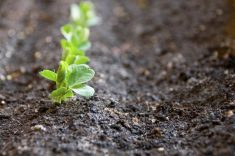Under a blazing sun, Senator Rob Black shared insights from the recently released soil study “Critical Ground.”
The senator spoke metres from the Ontario Soil and Crop Improvement Association’s soil pit, displaying the challenges and benefits of soil health during Canada’s Outdoor Farm Show on Sept. 11.
“My biggest fear is that we’re going to wake up someday and realize that we can’t feed our province,” said Black. “Let alone the country or the two billion more that we have in the world (in 30 years). That’s a scary thing.”
Read Also

Federal budget shows remaining disconnect between agriculture, policymakers, panelists say
Canada’s agriculture sector is still disconnected from policymakers in some ways, say panelists at a CAPI webinar
The report makes 25 recommendations; however, designating soil as a national strategic resource, creating a national soil database and appointing a national soil advocate all rank high on Sen. Black’s wish list.
Heather White, Soils at Guelph knowledge mobilization and communications coordinator, said Critical Ground’s focus is a broader road map to soil-health benefits compared to the narrower conservation angle of Senator Herb Sparrow’s 40-year-old report “Soil at Risk.”
“Soil health is a suite of principals being applied, as opposed to a particular practice, which is a good way to think about how to manage the diversity of soil,” White said. “It’s easy to forget about soil’s importance and take it for granted. It’s putting it on people’s radars again, and that’s important.”
Additionally, the report highlights the relationship between water management and soil health, the need for data-driven decisions and support for data capture, whether it’s a snapshot or aspects requiring ongoing monitoring.
“It certainly highlights the need for a connecting piece between the research and the practitioners,” she said, adding Soils at Guelph provides a conduit for fact-based information.
The report was tabled in the Senate on June 13, with the government having until Nov. 10 to respond.
“Then it’s time for all of us, organizations, individuals, journalists, to keep their feet to the fire,” he said. “If they say they’re going to act on identifying soils as a national asset, then let’s get that done.”
Black urged anyone to utilize the report to advance soil health advocacy and research.
While in Vancouver in June, speaking with the Canadian Society of Soil Scientists, he learned they were using it for funding applications – six days after its release.
“That’s pretty cool,” he said, adding he hopes the government will willingly drive the report forward. “We can push and shove them, collectively as organizations, provincially and nationally, but my hope is they’ll see the value in what we did.”















